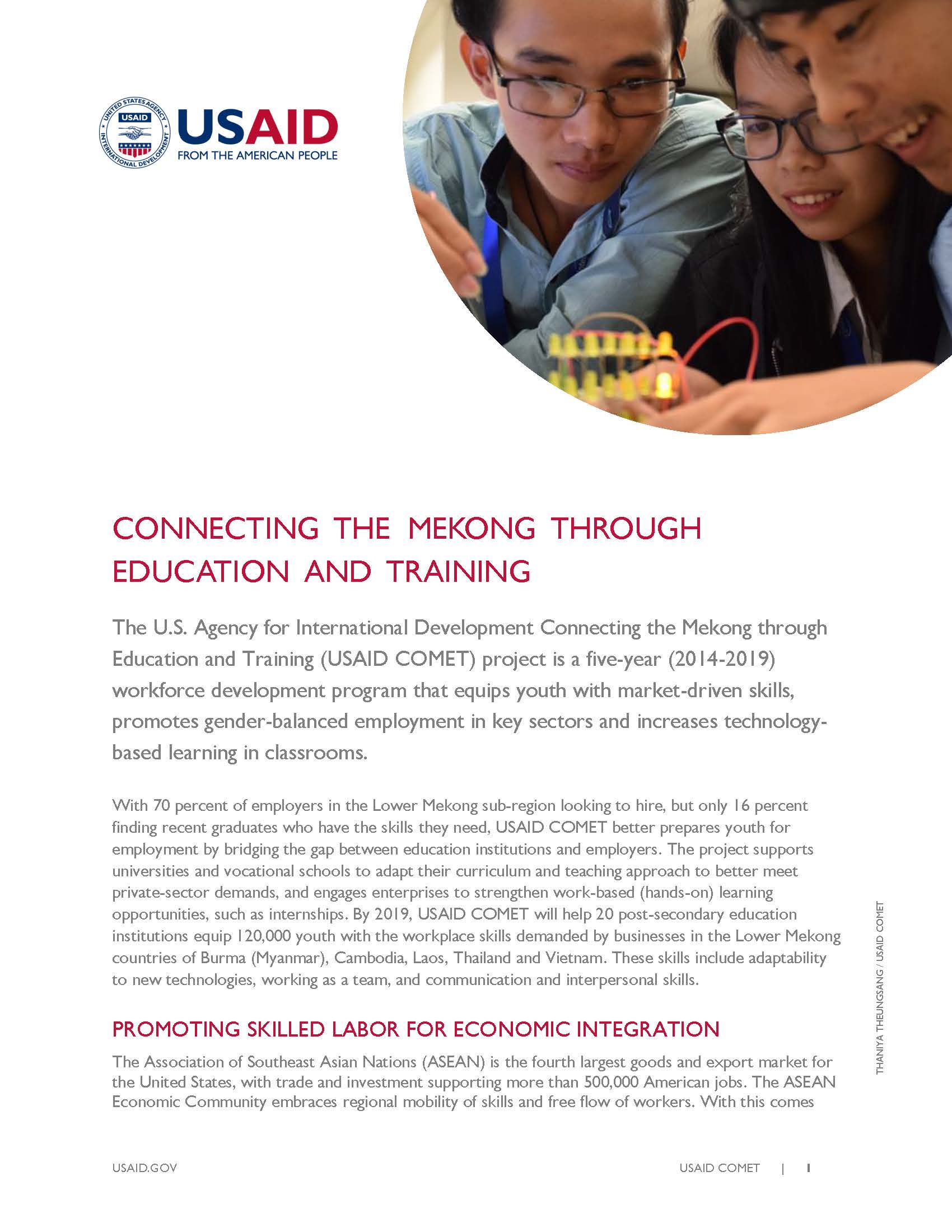Connecting the Mekong through Education and Training ![]() (pdf - 172k)
(pdf - 172k)
The U.S. Agency for International Development Connecting the Mekong through Education and Training (USAID COMET) project is a five-year (2014-2019) workforce development program that equips youth with market-driven skills, promotes gender-balanced employment in key sectors and increases technology-based learning in classrooms.
With 70 percent of employers in the Lower Mekong sub-region looking to hire, but only 16 percent finding recent graduates who have the skills they need, USAID COMET better prepares youth for employment by bridging the gap between education institutions and employers. The project supports universities and vocational schools to adapt their curriculum and teaching approach to better meet private-sector demands, and engages enterprises to strengthen work-based (hands-on) learning opportunities, such as internships. By 2019, USAID COMET will help 20 post-secondary education institutions equip 120,000 youth with the workplace skills demanded by businesses in the Lower Mekong countries of Burma (Myanmar), Cambodia, Laos, Thailand and Vietnam. These skills include adaptability to new technologies, working as a team, and communication and interpersonal skills.
PROMOTING SKILLED LABOR FOR ECONOMIC INTEGRATION
The Association of Southeast Asian Nations (ASEAN) is the fourth largest goods and export market for the United States, with trade and investment supporting more than 500,000 American jobs. The ASEAN Economic Community embraces regional mobility of skills and free flow of workers. With this comes opportunity for businesses as they gain access to a wider pool of skilled labor – but also greater challenges for graduates as they enter an increasingly competitive labor market. Youth in the Lower Mekong region in particular must gain the skills they need to fill the jobs that are in-demand in the marketplace – specifically in the Science, Technology, Engineering, Mathematics, Accounting and Tourism (STEM-AT) sectors. USAID COMET strengthens workforce competitiveness in these sectors by providing students and job seekers with relevant skills – and opportunities to practice those skills in a real workplace setting.
CONNECTING STUDENTS WITH THE MEKONG MARKETPLACE
Through annual labor market assessments, the project identifies the priorities, challenges and opportunities in the region as voiced by employers, education institutions and job-seekers. Through the MekongSkills2Work Network – a group of universities, vocational colleges, and industry partners – USAID COMET promotes innovative education with technology-based solutions. Instructors are trained in dynamic classroom approaches, such as exploring real-world problems through project-based learning, and in modern strategies for complementing online learning with in-person classes. Work-based learning opportunities that provide hands-on experience, such as internships, are built into the curriculum.
IMPACT AND RESULTS
- Over 34,000 students trained in 2016 in the MekongSkills2Work Sourcebook, USAID COMET’s online experiential learning toolkit.
- Over 600 ASEAN youth competed in the Young Southeast Asian Leaders Initiative Innovation Challenge, pitching innovative solutions to some of the world’s most pressing food security challenges. Cisco and Intel provided mentorship and jointly hosted a “boot camp” in Singapore to aid the teams in refining their technology solutions. National Instruments is hosting the three finalist teams to participate in an externship to Austin, Texas.
- Intel, Cisco, and Microsoft collaborated on a workshop entitled “Women in Technology” in Vietnam in January 2016, bringing together college-level women to broaden professional interests, share challenges and opportunities for women in science and technology and build a professional network in the region.
PARTNERS
The project collaborates with leading multinational technology companies such as Cisco, Google, Intel and Microsoft to leverage technology and innovative instruction in classrooms. Collaboration with local industry partners is growing through the project’s leadership institutions – the Mekong Learning Centers.
Click here for PDF file.








Comment
Make a general inquiry or suggest an improvement.